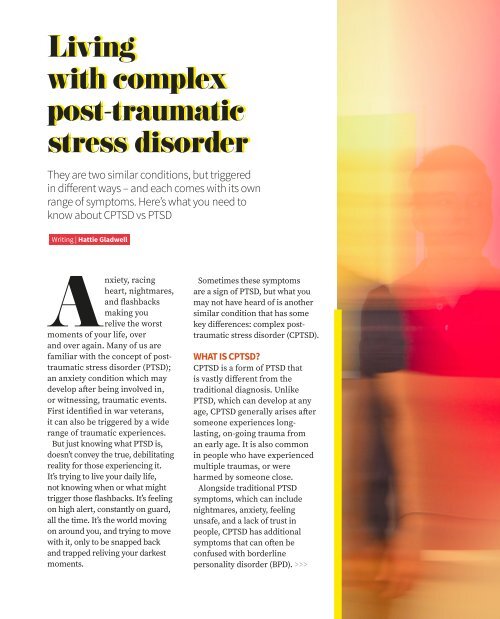Happiful November 2019
You also want an ePaper? Increase the reach of your titles
YUMPU automatically turns print PDFs into web optimized ePapers that Google loves.
Living<br />
with complex<br />
post-traumatic<br />
stress disorder<br />
They are two similar conditions, but triggered<br />
in different ways – and each comes with its own<br />
range of symptoms. Here’s what you need to<br />
know about CPTSD vs PTSD<br />
Writing | Hattie Gladwell<br />
Anxiety, racing<br />
heart, nightmares,<br />
and flashbacks<br />
making you<br />
relive the worst<br />
moments of your life, over<br />
and over again. Many of us are<br />
familiar with the concept of posttraumatic<br />
stress disorder (PTSD);<br />
an anxiety condition which may<br />
develop after being involved in,<br />
or witnessing, traumatic events.<br />
First identified in war veterans,<br />
it can also be triggered by a wide<br />
range of traumatic experiences.<br />
But just knowing what PTSD is,<br />
doesn’t convey the true, debilitating<br />
reality for those experiencing it.<br />
It’s trying to live your daily life,<br />
not knowing when or what might<br />
trigger those flashbacks. It’s feeling<br />
on high alert, constantly on guard,<br />
all the time. It’s the world moving<br />
on around you, and trying to move<br />
with it, only to be snapped back<br />
and trapped reliving your darkest<br />
moments.<br />
Sometimes these symptoms<br />
are a sign of PTSD, but what you<br />
may not have heard of is another<br />
similar condition that has some<br />
key differences: complex posttraumatic<br />
stress disorder (CPTSD).<br />
WHAT IS CPTSD?<br />
CPTSD is a form of PTSD that<br />
is vastly different from the<br />
traditional diagnosis. Unlike<br />
PTSD, which can develop at any<br />
age, CPTSD generally arises after<br />
someone experiences longlasting,<br />
on-going trauma from<br />
an early age. It is also common<br />
in people who have experienced<br />
multiple traumas, or were<br />
harmed by someone close.<br />
Alongside traditional PTSD<br />
symptoms, which can include<br />
nightmares, anxiety, feeling<br />
unsafe, and a lack of trust in<br />
people, CPTSD has additional<br />
symptoms that can often be<br />
confused with borderline<br />
personality disorder (BPD). >>>

















